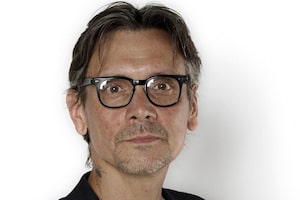ARCTIC DEFENDERS (2013).Unikkaat Studios
'You can't swing a cat in this town without hitting an artist," observes filmmaker and musician Dennis Allen in the light of a crackling bonfire. "But that's what makes it great."
Allen, whose documentary about alcoholism and addiction among First Nations communities, Crazywater, has just premiered to a near sold-out house at the 12th annual Available Light Film Festival in Whitehorse, soon abandons the fire to pick up his guitar in the home of Yukon Film Society board member Daniel Janke. People have gathered in his chalet to hear Allen, Janke and documentary filmmaker John Walker (Passage) play a woodshed session of blues and country tunes.
This type of event is the essence of both the week-long ALFF, which annually draws about 5,000 moviegoers from a regional population of about 40,000, and Whitehorse itself, which is so rife with artistic pilgrims from across Canada that you can't swing a cat without hitting a recent regional convert, either. It seems everybody here came from somewhere else and never left.
"It's a combination of the landscape and the culture," says filmmaker Andrew Connors, director of the film festival who came to Whitehorse via Dawson in 1992 and never looked back. "Because [Whitehorse] has four levels of government, it's kind of like a mini-Ottawa, but it's a mini-Ottawa where you can step out your back door, see mountains and cross-country ski to work. That's why it's a magnet and a hub for Canadians from everywhere."
In Janke's living room, the music delights just such a cross-section: filmmakers, industry reps, artists and festival staff sitting on chairs, stairs and spots on the floor, calling out requests and stepping over each other on the way to the bar. Everyone's happy except the sullen sheepdog Benny, who clearly wishes folks would just go home and let him sleep in peace.
This year, the Available Light Film Festival opened with a sold-out screening of Walker's Arctic Defenders at the Yukon Arts Centre, a five-year-old facility with a state-of-the-art digital projection theatre that ranks among the country's most impressively immersive cinematic venues. When Walker's film shows a boat lurching vertically over icy water, your grip on the armrest instinctively tightens.
His film itself is a perfect entrée to the festival. The story of Walker's journey back to the North, which first lured him as a teenage photographer, uncovers the largely hidden history of the forced relocation of Inuit communities from Quebec to the far North in a state program to establish regional sovereignty. Arctic Defenders also embodies a checklist of the festival's curatorial and philosophical priorities: the North, First Nations issues, documentary filmmaking and the traditional, essential, human practice of storytelling.
For Connors, who dropped out of University in Guelph and headed northwest in search of artistic inspiration and expanded horizons, the festival got its inspirational launch in its first year, 2002, when Zacharias Kunuk's Atanarjuat: The Fast Runner sold out multiple screenings and set the tone for ALFF's evolution.
"It took Zacharias two days to travel here from Iqaluit, and still does," Connors notes, "which tells you a lot about this country's traditional lines of communication, which are still north-south. He stayed the full week and met with just everybody who came. That's when I knew we were on to something special."
The festival proudly showcases documentaries, First Nations-related productions, local projects and Canadian films. But it also has an international component, which Connors considers essential, especially given the dearth of non-Hollywood fare in Whitehorse's few commercial cinemas. This year, a Spanish-Mexican production, La jaula de oro (The Golden Cage), has its local premiere the same evening as Don McKellar's The Grand Seduction. And the U.K./Russian co-production Pussy Riot: A Punk Prayer tops off an evening that includes the Igloolik-set Uvanga, by Marie-Hélène Cousineau and Madeline Piujuq Ivalu; and Rob Stewart's Revolution.
Back at the chalet, Allen strikes up a conversation with the newly arrived McKellar, reminding the Toronto actor-writer-director of the first time they met, some years ago in Edmonton, when Allen raised his hand during a master-class session to ask McKellar what he did. Allen had never heard of him.
"Those guys talking to each other like that," Connors says with a grin. "That's what this thing is all about."
 Geoff Pevere
Geoff Pevere